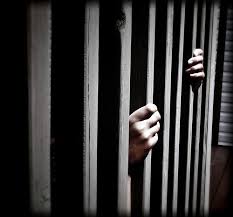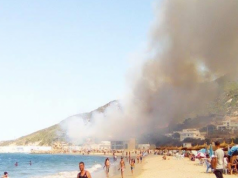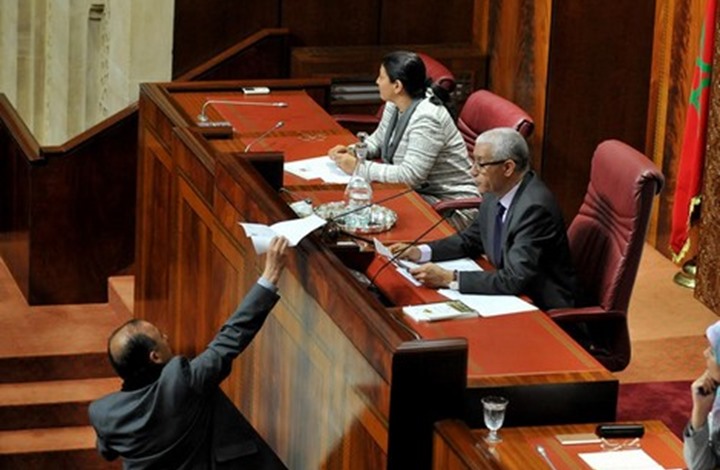Rabat, Morocco (TMT)- The Morocco-GCC Summit kicked off Wednesday, April 20, 2016, night at the Al-Dariya Palace in Riyadh.
Here follows King Mohammed VI’s full text of his addressed speech to the leaders of the six-member Gulf cooperation Council (GCC), as relayed by Morocco’s Ministry of Foreign Affairs and Cooperation.
“Praise be to God May peace and blessings be upon the Prophet, His Kith and Kin
Your Majesties,
Your Highnesses,
Your Excellencies,
Dear Brothers,
My heart is brimming over with affection and pride, as is always the case when I come to the Arab Gulf region.
I should like, first, to extend my sincere thanks to my brother, the Custodian of the Two Holy Mosques, King Salman bin Abdulaziz Al Saud, for hosting this important Summit, and to thank all leaders of GCC States for taking part in it.
I would also like to say how much I value the moral and material support you have been providing to Morocco to implement development projects and defend its just causes.
Our meeting today reflects the solid fraternal bonds and mutual esteem between us, as well as the close cooperation and solidarity between our countries.
By the grace of the Almighty, and despite the geographical distance, we are bound by solid relations that, in addition to language, religion and civilization, include a commitment to the same values and principles and the same constructive policies.
We are also facing the same challenges and threats, particularly with regard to security.
Why hold this Summit, which is the first of its kind? And why today?
Your Majesties,
Your Highnesses,
Your Excellencies,
Dear Brothers,
Thanks to our shared determination, we have managed to lay the foundations for a solid strategic partnership, which is the result of fruitful bilateral cooperation.
The Moroccan-Gulf partnership is not the result of transient interests or calculations. Rather, it derives its strength from a firm belief that ours is a common destiny and that we hold the same views on issues of common concern.
We are therefore meeting today to give strong impetus to this partnership, which has gained in maturity to the extent that we now need to lay down an institutional framework for it, and provide it with practical mechanisms.
There can be no better proof than this partnership that Arab joint action cannot be achieved through meetings and speeches, or formal periodic summits and ready-made, inapplicable resolutions. Rather, joint action requires serious endeavors, tangible cooperation and success stories which can be further consolidated and from which we can benefit; the pioneering GCC experience is a shining example in this regard.
It is a message of hope for ourselves and a strong signal to our peoples that we can develop common, rallying projects.
Your Majesties,
Your Highnesses,
This Summit is being held at a difficult time. The Arab region is being rocked by attempts to change regimes and divide states, as is the case in Syria, Iraq and Libya. As a result, many of the sons and daughters of the Arab homeland have either been uprooted, displaced or killed.
What has been described as the Arab Spring has caused destruction, chaos and human tragedies. And now we are witnessing a calamitous autumn, with attempts to lay hands on what remains of Arab countries’ resources and spoil successful experiences, like that of Morocco, by undermining its outstanding national model.
We respect the sovereignty of States, their choices and their freedom to establish and promote relations with partners of their own choosing. We are not here to call anybody to account for the political or economic choices they make.
And yet, there have been new alliances which may lead to disunity and a reshuffling of roles and functions in the region. In fact, these are attempts to foment strife and create chaos, and no country would be spared. It could have serious consequences for the region, even the world at large.
Though it remains committed to its strategic relations with its allies, Morocco has, in recent months, sought to diversify its partnerships at political, strategic and economic levels.
My successful visit to Russia, last month, is part of that process. It has made it possible to turn Moroccan-Russian relations into an in-depth strategic partnership, and a number of major agreements have been signed in several crucial areas.
We are also looking forward, in Morocco, to launching a strategic partnership with India, and also with the People’s Republic of China, to which I will soon be paying an official visit.
Morocco is free in its decisions and choices, and is not the exclusive preserve of any country; it will continue to honor the commitments it makes to its partners, and the latter should not think that their interests will be affected.
For this reason, the convening of this Summit is not targeting any party in particular, least of all our partners. It is a natural, logical initiative by countries which are defending their interests, as all countries do. My brothers in the Gulf bear the costs and consequences of the successive wars in the region.
Your Majesties,
Your Highnesses,
This is a serious situation which is compounded by egregious, misleading generalizations and insincerity, as shown by expressions of friendship and alliance on the one hand, and stabbing in the back, on the other.
So what do they want from us?
We are facing conspiracies which seek to undermine our collective security. Things are quite clear and require no further analysis. They want to destabilize the few countries which have managed to safeguard their security, stability and political systems.
I am referring to the Gulf countries, Morocco and Jordan, which are oases of peace and security for their citizens and a factor of stability in their respective regions.
We are all facing the same perils, the same threats, though their origins and manifestations may differ.
Therefore, to defend our security is not only a shared obligation, but it is also a collective, indivisible one. Morocco has always perceived the security and stability of Gulf countries as an intrinsic part of its own security and stability. What hurts you hurts us, and what affects us affects you.
Morocco has consistently sought to demonstrate this in all situations and circumstances. The aim has been to stand up to all threats in the region, as in the First Gulf War, the operation in Yemen to restore legitimacy and the ongoing security and intelligence cooperation.
Your Majesties,
Your Highnesses,
Dear Brothers,
The hostile plots which seek to undermine our stability are continuing; they will not stop. Several countries in the eastern part of the Arab world have been torn apart and destroyed; today, it is the western part which is targeted, and the most recent of these conspiracies has been hatched against the territorial integrity of your second home, Morocco.
There is nothing new in this. Morocco’s opponents are using every means, directly or otherwise, as part of their thinly-veiled maneuvers.
Thus, depending on the circumstances, they try to delegitimize Morocco’s presence in its Sahara, promote the independence option and the separatist thesis, or undermine the autonomy initiative, which the international community has described as serious and credible.
As the plotting continues, the month of April, which coincides with the Security Council meetings on the Sahara issue, has become a bogeyman used against Morocco and a tool to exert pressure on my country at times, and blackmail it at others.
Your Majesties,
Your Highnesses,
I cannot let this occasion pass without expressing my pride and appreciation for the constant support you have been giving my country for the defense of its territorial integrity.
The question of the Moroccan Sahara has always been the cause of Gulf countries as well. And this is hardly surprising.
In 1975, delegations from Saudi Arabia, Kuwait, Qatar, the Sultanate of Oman and the United Arab Emirates took part in the Green March for the recovery of our southern provinces. The participants included my brother, His Highness Sheikh Mohammed bin Zayed Al-Nahyan, Crown Prince of Abu Dhabi, who was 14 years old at the time.
Since then, the Gulf States have spared no effort to uphold our just cause and defend Morocco’s sovereignty over its entire territory. This position was reaffirmed during the recent crisis with the UN Secretary-General. Only this time, the situation is serious. It is also unprecedented in the history of this artificial dispute over the Moroccan Sahara.
What we are witnessing, in fact, is a proxy war, in which the Secretary-General of the United Nations is being used to infringe on Morocco’s legitimate, historical rights in its Sahara, through biased statements and unacceptable behavior regarding the Moroccan Sahara.
This should not come as a surprise, for there is something that might explain it all! Indeed, what can one expect from the Secretary-General when he himself admits that he is not fully informed on the Moroccan Sahara issue – nor is he on many others? He is unaware of this issue’s intricate developments and its real background.
What can the Secretary-General do while he is a hostage in the hands of some of his aides and advisers, to whom he delegates the responsibility of managing a number of important issues and settles for merely implementing the proposals they submit to him.
It is a fact that some of these aides have national agendas. They are politically motivated and they serve other parties’ interests without regard for their duty, as staff members of the United Nations Organization, to act impartially and objectively – an obligation that lies at the very heart of UN action.
The Secretary-General, whom I personally esteem, is only human after all. He cannot be fully cognizant of all issues on the United Nations’ agenda, nor find solutions to all crises and conflicts around the world.
I wish to emphasize, in this respect, that Morocco does not have a problem with the United Nations Organization, of which it is an active member; nor does it have a problem with the Security Council, whose members it respects and with whom it is constantly in touch. Morocco has a problem with the Secretary-General, and more particularly with some of his aides, because of their hostile positions towards my country.
As regards this artificial dispute over our territorial integrity, Morocco has always liaised with its traditional friends, which include the United States of America, France and Spain, and with Arab sister nations, especially the Gulf States, as well as African countries, such as Senegal, Guinea, Cote d’Ivoire and Gabon.
We have a problem because of frequently changing governments in some of these countries.
With every change, significant efforts have to be exerted to introduce new officials to all aspects of the Moroccan Sahara issue and to make them aware of its real implications. They have to be reminded that this dispute, which has been going on for more than forty years, has caused many casualties, that its material cost has been considerable and that the Sahara issue is the cause of all Moroccans, and not just the Monarchy’s.
Your Majesties,
Your Highnesses,
Your Excellencies,
Now is the time for honesty and truth. The Arab world is going through a difficult period. What some States are experiencing is not exceptional; it is all part of well-planned schemes that target us all.
Terrorism does more than just tarnish the reputation of Islam and Muslims; it is also being used by some people as a pretext to divide our States and foment strife in them.
For this reason, the different schools of Islamic jurisprudence need to engage in a frank, in-depth dialogue to correct misrepresentations, convey the true image of Islam and uphold, once again, the tolerant values of our faith.
What is at stake is not the situation in a particular country as much as the need, for all of us, to be aware of the challenges confronting us and to show genuine determination to renew our strategic pact with our partners, on the basis of clear determinants that can govern our relations in the decades to come.
This is a turning point; a watershed moment between what we want and what the others want us to be.
Today, more than ever, we need clear, unified stances between all Arab States. Either we stand together, like a solid structure, whose parts reinforce one another, or we become something we do not want to be.
May Almighty God grant us success, for the benefit of our peoples and our Ummah.
Wassalamu alaikum warahmatullah wabarkatuh.”





